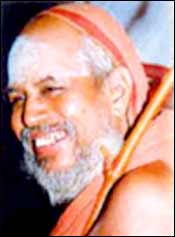Home > News > The Ayodhya Issue > Report
Maybe I should not have mentioned Kashi, Mathura: Kanchi seer
Saisuresh Sivaswamy in Kanchipuram |
July 15, 2003 17:01 IST
Last Updated: July 15, 2003 19:52 IST
The Shankaracharya of Kanchipuram, Sri Jayendra Saraswati, on Tuesday said he may have erred in mentioning the Kashi and Mathura disputes in his communication to the All India Muslim Personal Law Board, which led to the latter angrily staying off the negotiations.
Kanchi seer was candid in his letters
Text of Kanchi seer's letter
Kanchi seer's proposals have hardened stands
Complete coverage: The Ayodhya dispute
"I agree maybe I should not have said it, but what to do?" the seer told rediff.com in an exclusive interview at the Sankara Matham in Kanchipuram, the first since the dialogue broke down between the two sides.
 Nor did he intend a veiled threat to the Muslim community, when he told them in the letter dated July 1, to be prepared to give up the two sites someday. "A threat doesn't sound like that," he said. "It was more a realistic indication to them. Nor did I mean that tomorrow the issue will be raked up, all I meant was that they must look at the whole thing realistically," he said, as devotees kept up a stream outside the room.
Nor did he intend a veiled threat to the Muslim community, when he told them in the letter dated July 1, to be prepared to give up the two sites someday. "A threat doesn't sound like that," he said. "It was more a realistic indication to them. Nor did I mean that tomorrow the issue will be raked up, all I meant was that they must look at the whole thing realistically," he said, as devotees kept up a stream outside the room.
Since his letter to the Board, he said, there has been no overtures from them. "They have not replied to my letter. In fact, they have not even reacted to the main part of my letter but focused on the bit about Kashi and Mathura."
"My doors are open for talks, as I am sure their doors are," he said. "I think it is time now to discuss face to face rather than through letters."
The Shankaracharya also said the issue could be solved if politicians stayed away from it. "They have infused politics into everything." Nor was he playing politics, as charged by former prime minister Chandra Shekhar.
"This is a question of faith, nothing else. When he [Chandra Shekhar] was PM he sent his delegation to this same Mutt to discuss Ayodhya, at that time it didn't seem like I was playing politics, but now that he is not prime minister I am a politician," he laughed.
The solution to Ayodhya, he said, involved Muslims being large-hearted and gifting the site to Hindus. Asked why Hindus cannot show the same spirit of large-heartedness, he said, "For them it is only a site, they can build the mosque anywhere else, but for us it is a site that has immense faith."
It was for this same reason, he said, that even if the archaeological excavations currently on at the Ayodhya site showed there was no temple at the base of the Babri mosque no one would take it seriously.
"We are discussing faith, people's belief. You don't question other such beliefs in other faiths, but you are willing to question the Hindus' belief?" he chided.
Asked how come he, a Saivite guru, was mediating in the temple to Ram, regarded as a reincarnation of Vishnu -- a charge first voiced by the Vishwa Hindu Parishad -- he said, "People who say that need to be reminded that before embarking on his Lanka Yatra Ram prayed to Lord Shiva at Rameswaram."
Asked if his efforts to solve the Ayodhya nettle ahead of the assembly elections this year -- which could redound to the Bharatiya Janata Party's credit -- were due to the personal rapport with Prime Minister Atal Bihari Vajpayee, the seer said, "Who comes to power, who does not, is not what motivates me. I am concerned about the country, genuinely interested in solving problems facing it. You say I am close to the BJP, but we have always been close to the Congress party. Everybody has come here, Indira Gandhi, Rajiv, Sonia. My concern is that a problem that is dividing Indians be solved amicably, since it is the poor people who ultimately suffer. Not the people who are playing politics and dividing people in the name of religion."
"Ego problems," he said, "needed to be overcome" if the Ayodhya problems were to be solved. Describing his interlocutor, AIMPLB President Maulana Rabey Hasan Nadvi as a "decent man," the seer said he was hopeful of a solution so long as people like him were around.